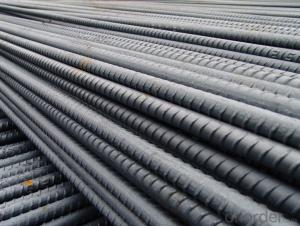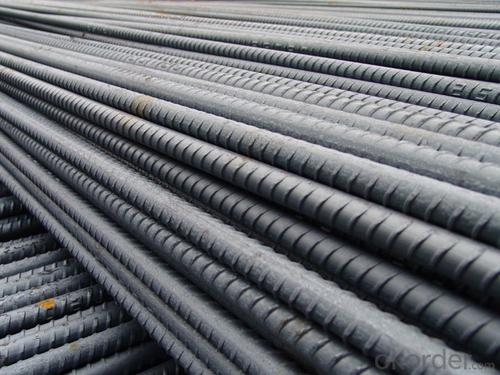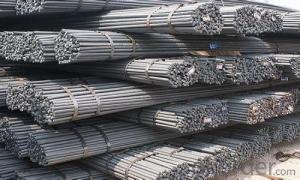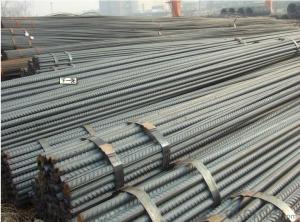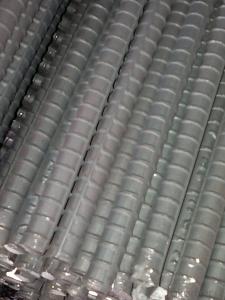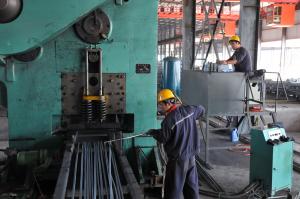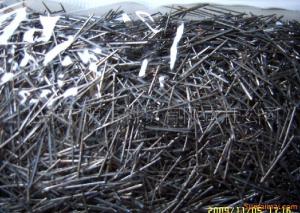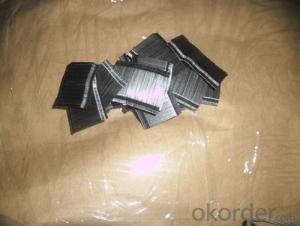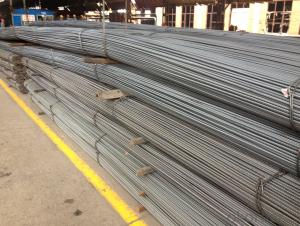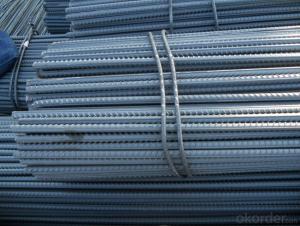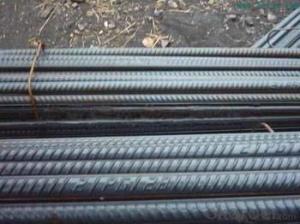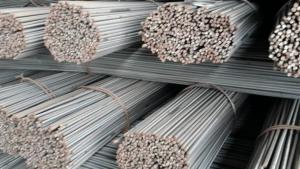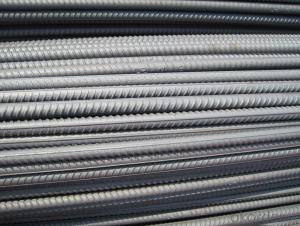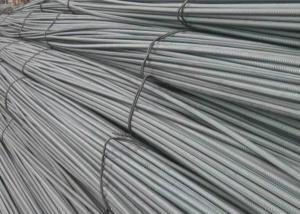Reinforcing Steel Rebar for Construction and Concrete
- Loading Port:
- China main port
- Payment Terms:
- TT or LC
- Min Order Qty:
- 100 m.t.
- Supply Capability:
- 100000 m.t./month
OKorder Service Pledge
OKorder Financial Service
You Might Also Like
Product Description:
OKorder is offering Reinforcing Steel Rebar for Construction and Concrete at great prices with worldwide shipping. Our supplier is a world-class manufacturer of steel, with our products utilized the world over. OKorder annually supplies products to African, South American and Asian markets. We provide quotations within 24 hours of receiving an inquiry and guarantee competitive prices.
Product Applications:
Reinforcing Steel Rebar for Construction and Concrete are ideal for structural applications and are widely used in the construction of buildings and bridges, and the manufacturing, petrochemical, and transportation industries.
Product Advantages:
OKorder's Reinforcing Steel Rebar for Construction and Concrete are durable, strong, and wide variety of sizes.
Main Product Features:
· Premium quality
· Prompt delivery & seaworthy packing (30 days after receiving deposit)
· Can be recycled and reused
· Mill test certification
· Professional Service
· Competitive pricing
Product Specifications:
Manufacture: Hot rolled
Grade: HRB335,HRB400,HRB500
Certificates: ISO, SGS, BV, CIQ
Length: 6m – 12m, as per customer request
Packaging: Export packing, nude packing, bundled
| DEFORMED BAR | |
| SIZE d(mm) | theoretical kg/m |
| 6 | 0.222 |
| 8 | 0.395 |
| 10 | 0.617 |
| 12 | 0.888 |
| 14 | 1.21 |
| 16 | 1.58 |
| 18 | 2 |
| 20 | 2.47 |
| 22 | 2.98 |
| 25 | 3.85 |
| 28 | 4.83 |
| 32 | 6.31 |
FAQ:
Q1: Why buy Materials & Equipment from OKorder.com?
A1: All products offered byOKorder.com are carefully selected from China's most reliable manufacturing enterprises. Through its ISO certifications, OKorder.com adheres to the highest standards and a commitment to supply chain safety and customer satisfaction.
Q2: what is the difference between actual weight and theoretical weight?
A2: All the section steel has two weights: actual weight and theoretical weight. Actual weight is the weighing out when the product delivered from the mill. Theoretical weight is calculated by pieces. The invoice can be based on each of them as your request.
Q3: How soon can we receive the product after purchase?
A3: Within three days of placing an order, we will arrange production. The normal sizes with the normal grade can be produced within one month. The specific shipping date is dependent upon international and government factors, the delivery to international main port about 45-60days.
Images:
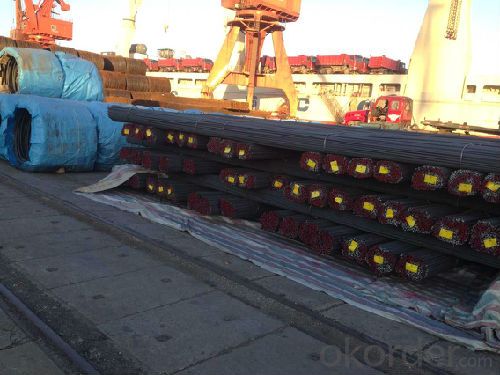
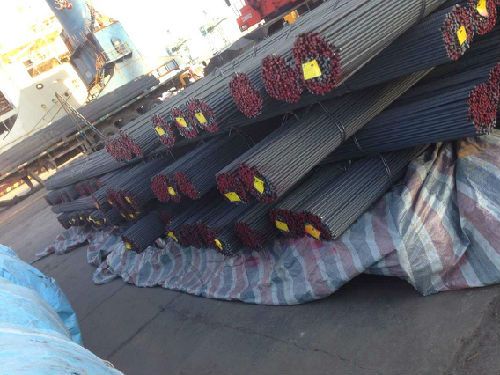
- Q: How are steel rebars classified based on their surface patterns?
- Steel rebars are classified based on their surface patterns into two main categories: plain rebars and deformed rebars. Plain rebars have a smooth and plain surface without any surface patterns or deformations. They are primarily used in applications where the concrete needs to slide along the rebar, such as in bridges and highway pavements. Plain rebars provide a high level of bonding between the steel and concrete due to the smooth surface, ensuring good load transfer between the two materials. On the other hand, deformed rebars have surface patterns or deformations that enhance their bonding with concrete. These patterns can be in the form of ribs, indentations, or other irregularities. Deformed rebars provide better mechanical anchoring to the concrete, preventing slippage and improving the overall structural integrity of reinforced concrete structures. Deformed rebars are further classified based on the type and shape of their surface patterns. Some common types include: 1. Ribbed rebar: These rebars have continuous, evenly spaced ribs along their entire length. The ribs provide increased bonding strength with the concrete, ensuring the rebar stays in place even under heavy loads. 2. Indented rebar: These rebars have indentations or impressions along their length. The indentations increase the surface area of the rebar, enhancing the bond between the steel and concrete. 3. Twisted rebar: These rebars have a twisted pattern along their length. The twisted pattern provides additional mechanical interlocking between the rebar and concrete. The choice of rebar surface pattern depends on the specific requirements of the construction project. Factors such as the type of structure, load-bearing capacity, and local building regulations play a crucial role in determining the appropriate classification of steel rebars based on their surface patterns.
- Q: Can steel rebars be used in pre-tensioned or post-tensioned structures?
- Yes, steel rebars can be used in both pre-tensioned and post-tensioned structures. In pre-tensioned structures, the rebars are tensioned before the concrete is poured, creating a compressive force in the concrete. In post-tensioned structures, the rebars are tensioned after the concrete has hardened, allowing for greater flexibility in design and reducing cracking.
- Q: How are steel rebars connected or joined together?
- Steel rebars are typically connected or joined together using different methods, depending on the specific application and structural requirements. The most common methods of connecting steel rebars are: 1. Overlapping: This method involves overlapping two rebars to create a continuous length of reinforcement. The overlapping length should meet the specified design requirements and is typically secured with steel tie wires or mechanical connectors. 2. Welding: Steel rebars can be joined together through welding, which involves melting the ends of the rebars and fusing them together using heat. Welding is a suitable method for connecting rebars in pre-fabricated structures or where high strength and durability are required. 3. Mechanical couplers: Mechanical couplers are pre-fabricated devices that provide a threaded connection between two rebars. These couplers are typically screwed onto the ends of the rebars, creating a strong and reliable connection. Mechanical couplers are commonly used in construction projects where fast installation and ease of use are important. 4. Lap splicing: Lap splicing involves connecting two rebars by overlapping them and securing the overlap with steel tie wires or mechanical connectors. This method is widely used in reinforced concrete structures and provides adequate strength and continuity. 5. Grouted splicing: In grouted splicing, the ends of two rebars are embedded into a sleeve or coupling filled with grout or epoxy resin. This method ensures a strong bond between the rebars, providing enhanced load transfer and corrosion resistance. It is important to note that the connection method used for steel rebars should comply with the applicable building codes and structural design specifications to ensure the overall integrity and safety of the structure.
- Q: How do steel rebars contribute to the crack control in slabs and walls?
- Steel rebars contribute to crack control in slabs and walls by providing reinforcement and increasing the structural strength of the concrete. When concrete is subjected to tensile forces, such as shrinkage, temperature variations, or external loads, it has a tendency to crack. However, the presence of steel rebars within the concrete helps to distribute these forces and resist the formation and propagation of cracks. The rebars act as reinforcement, absorbing and transferring the tensile stress, thus preventing the concrete from cracking and enhancing the overall durability and integrity of the structure.
- Q: Can steel rebars be used in hotel construction?
- Yes, steel rebars can be used in hotel construction. Steel rebars are commonly used in reinforced concrete structures, including the construction of hotels, due to their high tensile strength and ability to provide reinforcement and stability to the building.
- Q: Can steel rebars be used in structures with high wind loads?
- Yes, steel rebars can be used in structures with high wind loads. Steel rebars provide strength and durability, making them suitable for reinforcing concrete structures against the forces exerted by high wind loads.
- Q: Are there any limitations on the maximum length of steel rebars used in construction?
- Yes, there are limitations on the maximum length of steel rebars used in construction. The length of steel rebars is dependent on various factors such as the structural design, building codes, transportation constraints, and practical limitations. Typically, steel rebars are manufactured in standard lengths and can be extended by overlapping or splicing methods if needed. However, excessively long steel rebars may lead to handling difficulties, transportation issues, and increased risk of bending or damage. Thus, it is essential to adhere to the maximum length limitations specified by the relevant construction regulations and engineering standards.
- Q: What are the common surface patterns for steel rebars?
- Plain, deformed, and ribbed patterns are the common surface patterns for steel rebars. Plain rebars have a smooth surface and no patterns or indentations. They are used in applications where bendability or weldability is important, such as in reinforced concrete structures. On the other hand, deformed rebars have patterns or indentations on their surface, such as ribs, humps, or indentations. These patterns enhance bonding with the surrounding concrete and improve the grip between the rebar and concrete. This ensures better stress transfer and prevents slippage. Deformed rebars are widely used in construction projects, particularly in areas that require high tensile strength and bond strength. Ribbed rebars, a specific type of deformed rebar, have continuous longitudinal ribs along their length. These evenly spaced ribs provide additional anchorage and bond strength with the concrete. Ribbed rebars are commonly used in applications that require a higher level of bond strength, such as in seismic zones or structures subjected to heavy loads. In conclusion, the choice of surface pattern for steel rebars depends on the specific requirements of the construction project and the desired performance characteristics.
- Q: How do steel rebars provide structural stability and strength to buildings?
- Steel rebars provide structural stability and strength to buildings by reinforcing concrete structures. When embedded within the concrete, the rebars act as tension members, resisting the forces that try to pull the concrete apart. This reinforcement helps to distribute the loads evenly, preventing cracks and enhancing the overall durability and structural integrity of the building. Additionally, the high strength of steel rebars allows them to bear heavy loads and withstand external forces, such as wind and earthquakes, further enhancing the stability and strength of the structure.
- Q: What is the process of galvanizing steel rebars?
- The process of galvanizing steel rebars involves the application of a layer of zinc to the surface of the rebar in order to prevent corrosion and prolong its lifespan. The process typically consists of the following steps: 1. Surface Preparation: The steel rebars are cleaned thoroughly to eliminate any dirt, oil, or scale from the surface. This is typically achieved through the use of chemical cleaning agents and mechanical methods, such as sandblasting or shot blasting. 2. Pickling: Once cleaned, the rebars are submerged in a pickling solution, usually a mixture of hydrochloric acid and water. This solution eliminates any remaining impurities or oxides from the surface of the rebars. 3. Fluxing: The pickled rebars are then rinsed to eliminate any residual acid and are immersed in a flux solution. The flux solution aids in the removal of any remaining oxides and ensures proper adhesion of the zinc coating. 4. Galvanizing: The fluxed rebars are then dipped into a molten zinc bath. The temperature of the zinc bath is typically kept between 815 to 850 degrees Fahrenheit (435 to 455 degrees Celsius). The rebars are carefully immersed and then slowly withdrawn to allow excess zinc to drain off. 5. Quenching: After the galvanizing process, the rebars may be rapidly cooled in a specialized solution to stabilize the zinc coating. This step helps to prevent the excessive formation of zinc oxide on the surface. 6. Inspection: Once the galvanized rebars have cooled down, they undergo a comprehensive inspection to ensure the quality of the coating. Visual inspection, thickness measurement, and adhesion tests are commonly conducted to assess the integrity of the zinc coating. Overall, the galvanizing process provides a robust and effective protective coating for steel rebars, rendering them highly resistant to corrosion and extending their lifespan in a variety of applications, including construction, reinforcement, and infrastructure projects.
Send your message to us
Reinforcing Steel Rebar for Construction and Concrete
- Loading Port:
- China main port
- Payment Terms:
- TT or LC
- Min Order Qty:
- 100 m.t.
- Supply Capability:
- 100000 m.t./month
OKorder Service Pledge
OKorder Financial Service
Similar products
Hot products
Hot Searches
Related keywords
